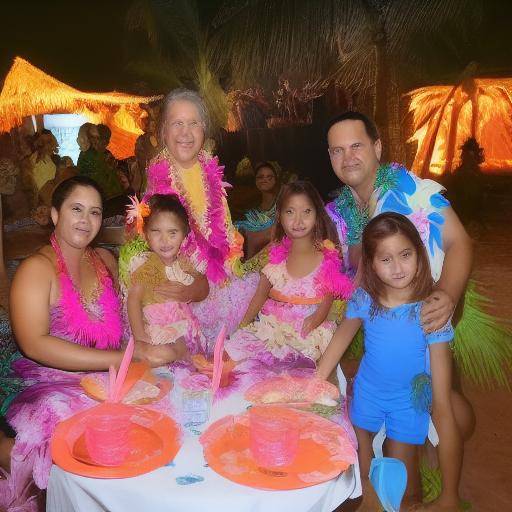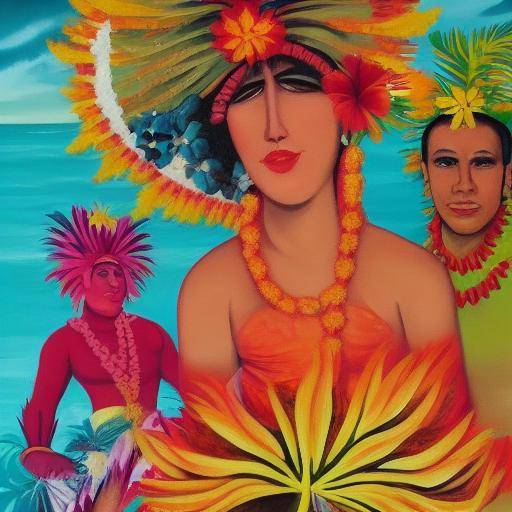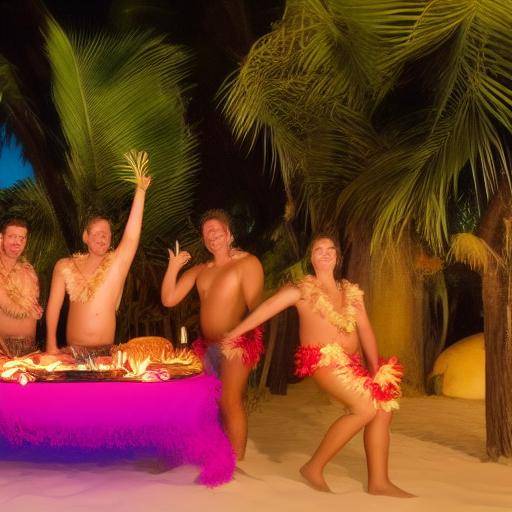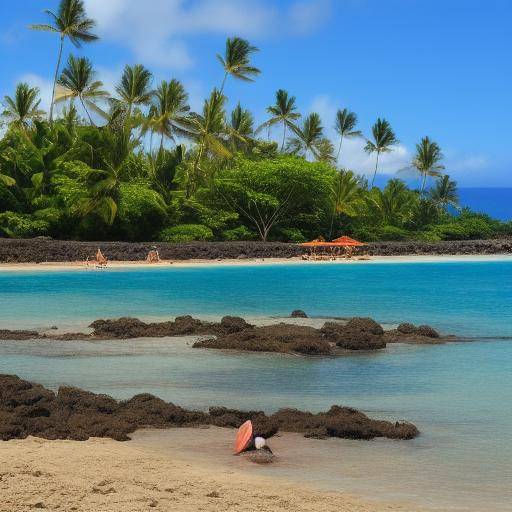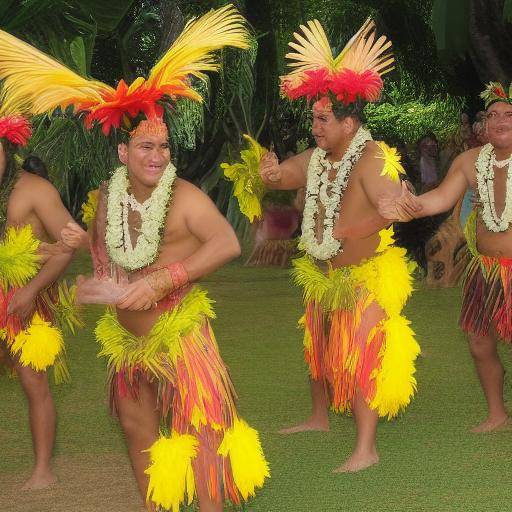
Introduction
Hawaiian Luau is a celebration that has transcended the limits of Hawaii to become an icon of Polynesian culture. In this article, we will explore the origin, evolution and historical importance of this tradition, as well as its relationship with the rich Polynesian history. In addition, we will analyze in detail the evolution of luau, its cultural meanings and its relevance today, providing a profound view of this unique holiday.
History and Background
Hawaiian Luau has its roots in the ancient Polynesian traditions dating back thousands of years. These Pacific peoples, known for their great ability to navigate and their rich artistic expressions, brought with them a deep sense of community and celebration. The holidays, in honor of the gods or to commemorate important events, were an integral part of their daily lives.
With the arrival of the first settlers to Hawaii, the concept of luau acquired a new dimension. These celebrations became a meeting point between the Polynesian and Western cultures, influencing and enriching the culinary, musical and ceremonial traditions. The luau became a symbol of the fusion of cultures, marking a milestone in the history of Hawaii and Polynesia in general.
Over the centuries, the celebration of the luau evolved, adapting to the changing socio-economic and political realities of Hawaii. The prohibition of certain cultural practices and the influence of Western colonization influenced the way Luaus were celebrated, often relegating them to more informal and family celebrations. However, the essence of sharing, joy and unity has always permeated the celebrations of luau, keeping tradition alive despite the challenges.
Analysis in Deep
Hawaiian luau is much more than just a holiday. Its cultural value and socio-economic impact in Hawaii make it a complex phenomenon worthy of detailed analysis. The tourist economy of Hawaii has benefited enormously from the popularity of the luau, becoming a fundamental tourist attraction. Moreover, the preservation and promotion of Polynesian traditions, such as hula and traditional music, have received a significant boost thanks to the popularity of luau.
However, with the growing marketing and standardization of the Luau celebrations, challenges have also arisen. Cultural authenticity has been threatened by the demands of the tourism industry, which has led to debates on how to preserve the integrity of luau as a genuine expression of Polynesian culture. Hawaiians and advocates of traditional culture struggle to keep the essence of luau alive in the face of the pressure of marketing and globalization.
Comprehensive review
The celebration of luau has become a local tradition to be a global phenomenon, influencing the culture and experiences of people around the world. The inclusion of elements of luau, such as food, music and decoration, at international festivals and cultural events demonstrates its impact beyond the borders of Hawaii. This expansion has generated the possibility that people from different cultures will immerse themselves in the rich history and traditions of Polynesia.
As luau has been transformed to adapt to diverse contexts, it has developed new forms and meanings. This evolution reflects both the ability of Polynesian traditions to adapt and the influence that other cultures have had in the configuration of contemporary luau. The appreciation of diversity and interculturality has become a fundamental element in how luau is understood and celebrated today.
Comparative analysis
Hawaiian Luau and Polynesian history intertwine intrinsically, showing similarities and differences that reveal the complexity and diversity of the region. While luau represents the amalgam of cultural influences in Hawaii over the centuries, Polynesian history encompasses a vast territory populated by various cultures, languages and traditions. However, both share the importance of community celebration, respect for nature and the preservation of ancestral traditions.
Hula dance, for example, is an emblematic artistic expression of both luau and Polynesian history in general. Although each island of Polynesia has its own version of hula dance, with variations in movements, musics and meanings, its preservation and promotion has served as a vehicle to transmit the history and identity of Polynesia to future generations.
Practical Tips and Recommendations
If you want to participate in a Hawaiian luau or explore Polynesian history, here are some practical recommendations:
- Investigate authenticity: Before attending a luau, investigate your approach and commitment to the preservation of cultural authenticity. Find those who offer rich and respectful experiences of Polynesian tradition.
- Interact with the local community: If you visit Hawaii, find opportunities to connect with the local community and learn firsthand about Polynesian history and traditions. Participating in authentic cultural activities can give you a deeper and more meaningful understanding.
- Explore the story: Dive into reading books, articles and historical resources to understand the rich Polynesian history and its influence on the celebration of the luau. Understanding historical contexts will enrich your cultural experience.
Industry Perspectives and Expert Reviews
Cultural experts and anthropologists agree that Hawaiian luau is an important vehicle for the preservation and promotion of Polynesian culture, although it faces significant challenges in the contemporary context. Marketing and mass tourism have been identified as factors that threaten the authenticity and integrity of luau, raising questions about how to balance cultural preservation with industry demands.
Case Studies and Practical Applications
In many places outside Hawaii, the Luaus have become a means of educating communities about Polynesian history and culture. Through artistic performances, interactive activities and traditional gastronomy, the Luaus outside Hawaii provide people with the opportunity to immerse themselves in Polynesian traditions and appreciate their rich cultural heritage.
Future Trends and Predictions
Current trends point to greater awareness and appreciation of cultural diversity, suggesting that luau and Polynesian history will continue to capture the interest of people around the world. Efforts to preserve cultural authenticity and promote respect for Polynesian traditions are likely to remain a priority, as globalization and marketing pose constant challenges.
Conclusion
Hawaiian Luau and Polynesian history are intrinsically intertwined, representing the wealth and diversity of a region that has captivated people from around the world. Whether through the celebration of luau, hula dance or traditional gastronomy, these cultural expressions give us the opportunity to connect with an ancient history and appreciate the Polynesian heritage. In understanding and honoring these traditions, we contribute to preserving and promoting the rich history of Hawaiian Luau and Polynesian culture in general.
Frequently asked questions
What is the meaning of Hawaiian luau and its importance in Hawaiian culture?
Hawaiian Luau is a celebration that represents hospitality, community union and the preservation of cultural heritage. Through food, music, dance and other artistic expressions, Luau is a symbol of identity and cultural roots for Hawaiians and a window for visitors to experience and appreciate the rich history of Hawaii.
What is the story of Hawaiian luau?
Luau has its roots in ancient Polynesian traditions, marking important celebrations and community meetings. With the influence of Western colonization, Luau evolved into a more modern celebration, merging elements of Polynesian culture with foreign influences. This evolution has shaped the way the luau is celebrated and perceived today.
How has luau adapted to the modern era?
Hawaiian luau has experienced significant changes to adapt to modern demands and expectations. Luau celebrations now include entertainment elements, artistic presentations and interactive activities to provide a more complete experience to guests. However, these changes have generated debates on the preservation of cultural authenticity in the celebrations of luau.
What is the role of luau in the Hawaii tourist industry?
Luau has played a fundamental role in Hawaii's tourist attraction, attracting visitors who seek to immerse themselves in Hawaiian culture and the Luau tradition. Luau celebrations have been an important source of income for the tourist industry, but they have also raised challenges in terms of maintaining cultural authenticity in the midst of commercial demands.
How does Polynesian history influence the celebration of Hawaiian luau?
Polynesian history has left a profound mark on the celebration of Hawaiian luau, influencing aspects such as gastronomy, music, dance and ceremonial traditions. The rich cultural heritage of Polynesia is reflected in the elements that characterize the luau, providing a window to the diversity and depth of Polynesian history.
How can you contribute to the preservation of luau and Polynesian history?
The preservation of Luau and Polynesian history requires a continuous commitment to cultural authenticity, respect for traditions and active participation in events and activities that promote the understanding and appreciation of Polynesian culture. This involves supporting local communities, assessing cultural diversity and participating in initiatives that promote the preservation and promotion of Polynesian history.
Conclusion
Hawaiian luau and Polynesian history represent a rich cultural heritage that transcends borders and generates a profound impact on those who experience it. In exploring these traditions and understanding their importance, we contribute to the preservation and promotion of Polynesian identity, enriching our understanding of the world and our appreciation for the cultural diversity that inhabits it.
We hope that this exploration of Hawaiian luau and Polynesian history has given you a deeper and meaningful understanding of these unique cultural celebrations and their relevance in the current context.

